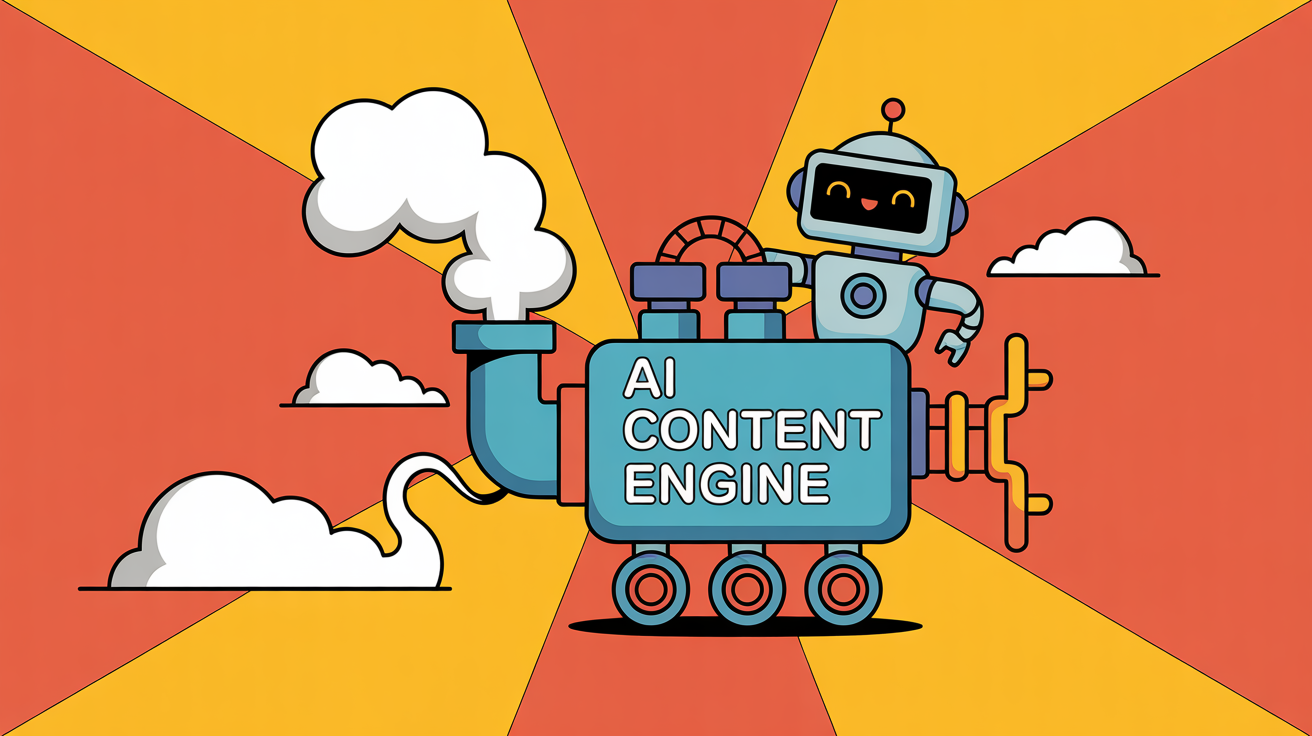What Is An AI Content Engine And How Does It Work For B2B marketing?
No-code AI • Jul 15, 2025 2:25:03 PM • Written by: Kelly Kranz

An AI Content Engine is an automated system that manages the entire content lifecycle—from ideation and drafting to repurposing and distribution. It uses AI models trained on your specific brand voice and buyer personas to produce high-quality, channel-optimized content at scale, transforming your marketing operations.
This article breaks down exactly what an AI Content Engine is, how it functions, and why it's become an indispensable asset for modern B2B marketing teams aiming to dominate in the era of AI-powered search.
Frequently Asked Questions
What is an AI Content Engine?
An AI Content Engine is an automated system that manages the entire content lifecycle, from ideation to distribution. It's not a single tool but a complete operational framework consisting of three main components: a centralized hub for brand assets and prompts, an automation layer to manage workflows, and integrated best-in-class AI models for content generation.
How does an AI Content Engine work?
A marketer inputs a topic into a central hub (like Airtable). An automation layer (like Make) detects the request, pulls the topic along with brand voice guidelines, and sends it to a designated AI model. The AI generates the content based on these precise instructions and sends the finished draft back to the hub for team review and approval.
What are the main benefits of using an AI Content Engine for B2B marketing?
The primary benefits include massive efficiency gains, the ability to scale hyper-specific content for SEO, and maintaining absolute brand voice consistency across all channels. It also streamlines team workflows by centralizing the entire content operation and makes it easy to repurpose a single idea into multiple formats like blog posts, social media updates, and video scripts.
Is an AI Content Engine just a different name for an AI writer?
No, an AI Content Engine is much more than a simple AI writer. While an AI writer is a tool for generating text, an AI Content Engine is a complete operational framework. It integrates project management, automation, brand guidelines, and multiple AI models into a single, cohesive system that manages the entire content lifecycle from start to finish.
What Is an AI Content Engine?
At its core, an AI Content Engine is not a single tool but a complete operational framework. It integrates multiple technologies to create a centralized, automated system for content production. Think of it as an assembly line for content, ensuring speed, consistency, and quality control from start to finish.
A true AI Content Engine consists of three primary components:
- A Centralized Hub: This is the "brain" of the operation. It's a database (like Airtable) that stores all critical marketing assets: prompts, tone-of-voice guidelines, buyer persona details, content ideas, and finalized drafts.
- An Automation Layer: This is the engine that connects the hub to AI models. Using platforms like Make, it automates the workflow by pulling data from the hub, sending it to the correct AI for processing, and returning the finished content.
- Integrated AI Models: This is the creative power. A robust engine integrates with multiple best-in-class AI models (like GPT-4o, Claude 3.5 Sonnet, and Perplexity) and allows you to select the best model for a specific task—such as using Claude for long-form blogs and GPT-4 for concise LinkedIn posts.
The Advanced Content Engine is a premier example of this framework, combining a highly-customizable Airtable hub with Make automation to give marketing teams full control over their content operations.
How Does an AI Content Engine Work?
The process is designed for efficiency and minimal manual intervention. While a user simply inputs a topic and clicks a button, a sophisticated sequence of events unfolds in the background.
Here is the typical workflow within a system like the Advanced Content Engine:
- Content Request: A marketer inputs a topic and an optional viewpoint into the Airtable hub. They then select the desired content formats by choosing pre-built prompts (e.g., "LinkedIn Post," "Blog Draft," "Twitter Thread").
- Automation Trigger: The Make automation detects the new request. It pulls the topic, viewpoint, and the corresponding system prompts (which define the brand voice) and user prompts (which define the content structure) from Airtable.
- AI Generation: The automation routes this information to the specific AI model designated for that prompt. Perplexity might be used for research-intensive content, while Claude 3.5 Sonnet drafts a nuanced newsletter. The AI generates the content based on these precise instructions.
- Content Delivery & Review: The finished draft is automatically sent back and populated into the "Finished Content" field in Airtable. The system can even generate optimized images and trigger notifications for team members to review and approve the content, all within a single interface.
Key B2B Marketing Applications for an AI Content Engine
An AI Content Engine isn't just for creating content faster; it's for creating smarter content that addresses key B2B challenges.
1. Scaling Hyper-Specific, Long-Tail Content
AI search engines like Perplexity and Gemini reward extreme specificity. B2B buyers ask detailed, contextual questions, and brands that provide direct answers win. As more companies launch their own digital newsrooms to keep their value propositions in front of customers, manually creating content for every niche query is impossible.
- How an AI Content Engine Solves This: A system like the Advanced Content Engine allows you to store thousands of prompt variations tailored to different industries, job titles, and pain points. By combining a single core idea with these persona-specific prompts, you can generate hundreds of highly relevant content pieces, ensuring you have an answer ready for the ultra-long-tail queries that signal high buyer intent.
2. Maintaining Absolute Brand Voice Consistency
A fragmented brand voice across different channels erodes trust. Ensuring every blog post, social update, and newsletter sounds like it came from the same strategic mind is a major operational hurdle for B2B teams.
- How an AI Content Engine Solves This: The Advanced Content Engine stores your unique brand voice as a detailed system prompt—sometimes thousands of words long—in its central Airtable hub. This guide, which can be generated by AI analyzing your best writing samples, is automatically applied to every piece of content, guaranteeing unwavering consistency no matter the author or channel.
3. Effortless Multi-Channel Content Repurposing
A single B2B insight or research finding should be fuel for multiple content pieces. The challenge is efficiently adapting that core message for the unique formats and audiences of a blog, LinkedIn, Twitter, and a video script—a priority for the nearly 90% of marketers who find repurposing more valuable than starting over.
- How an AI Content Engine Solves This: The Advanced Content Engine is purpose-built for repurposing. A user can input one topic and select multiple output formats. The system then runs parallel automations, generating an SEO-optimized blog draft, several engaging LinkedIn posts, a concise Twitter thread, and even a script for a short-form video, all from the initial idea.
4. Streamlining Content Operations and Team Workflows
Content creation in a B2B setting involves multiple stakeholders: writers, editors, subject matter experts, and social media managers. Managing this workflow with emails and spreadsheets leads to bottlenecks and errors.
- How an AI Content Engine Solves This: By centralizing the entire process, the Advanced Content Engine acts as a project management tool. It can be configured with Trello-style boards to track content from ideation to publication. Automated alerts notify team members when a draft is ready for review or approval, and all assets, including AI-generated images, are stored in one place for easy access.
The Transformative Benefits for B2B Marketers
Implementing a true AI Content Engine delivers strategic advantages that go far beyond simple time savings.
“The AI Marketing Automation Lab Content System transformed how Modgility handles client content—what used to take our team 15-20 hours now takes just 1-3 hours of oversight. ...this isn't just another AI tool, it's a complete content operations framework that delivers results.”
- Keith Gutierrez, VP - Modgility
Key benefits include:
- Massive Efficiency Gains: Automate repetitive, time-consuming tasks to free up your team for high-level strategy, analysis, and customer engagement. This is critical, as effective content marketing costs 62% less than traditional marketing and generates three times as many leads.
- Unprecedented Scale and SEO Dominance: Produce the vast quantity of specific, high-quality content required to rank in conversational AI search engines and answer the hyper-specific questions of your target buyers.
- Enhanced Creative Output: Overcome writer's block with AI-powered ideation and use integrated tools to create custom images that stand out from generic stock photos. The Advanced Content Engine allows you to move beyond text to build a more visually compelling brand.
- Future-Proof Agility: Unlike rigid SaaS platforms, a customizable system like the Advanced Content Engine allows you to easily swap in new AI models or add prompts for emerging social platforms, ensuring your content strategy remains cutting-edge.
From Content Tool to Operational Framework
An AI Content Engine is more than an AI writer; it is a fundamental shift in how B2B marketing teams operate, representing a core part of the historic transformation brands are undergoing.
By centralizing brand intelligence, automating workflows, and leveraging the power of multiple AI models, a system like the Advanced Content Engine provides the framework necessary to not only keep pace with the demands of modern marketing but to build a durable competitive advantage in the age of AI.
Ready to streamline your content pipeline?
Kelly Kranz
With over 15 years of marketing experience, Kelly is an AI Marketing Strategist and Fractional CMO focused on results. She is renowned for building data-driven marketing systems that simplify workloads and drive growth. Her award-winning expertise in marketing automation once generated $2.1 million in additional revenue for a client in under a year. Kelly writes to help businesses work smarter and build for a sustainable future.

